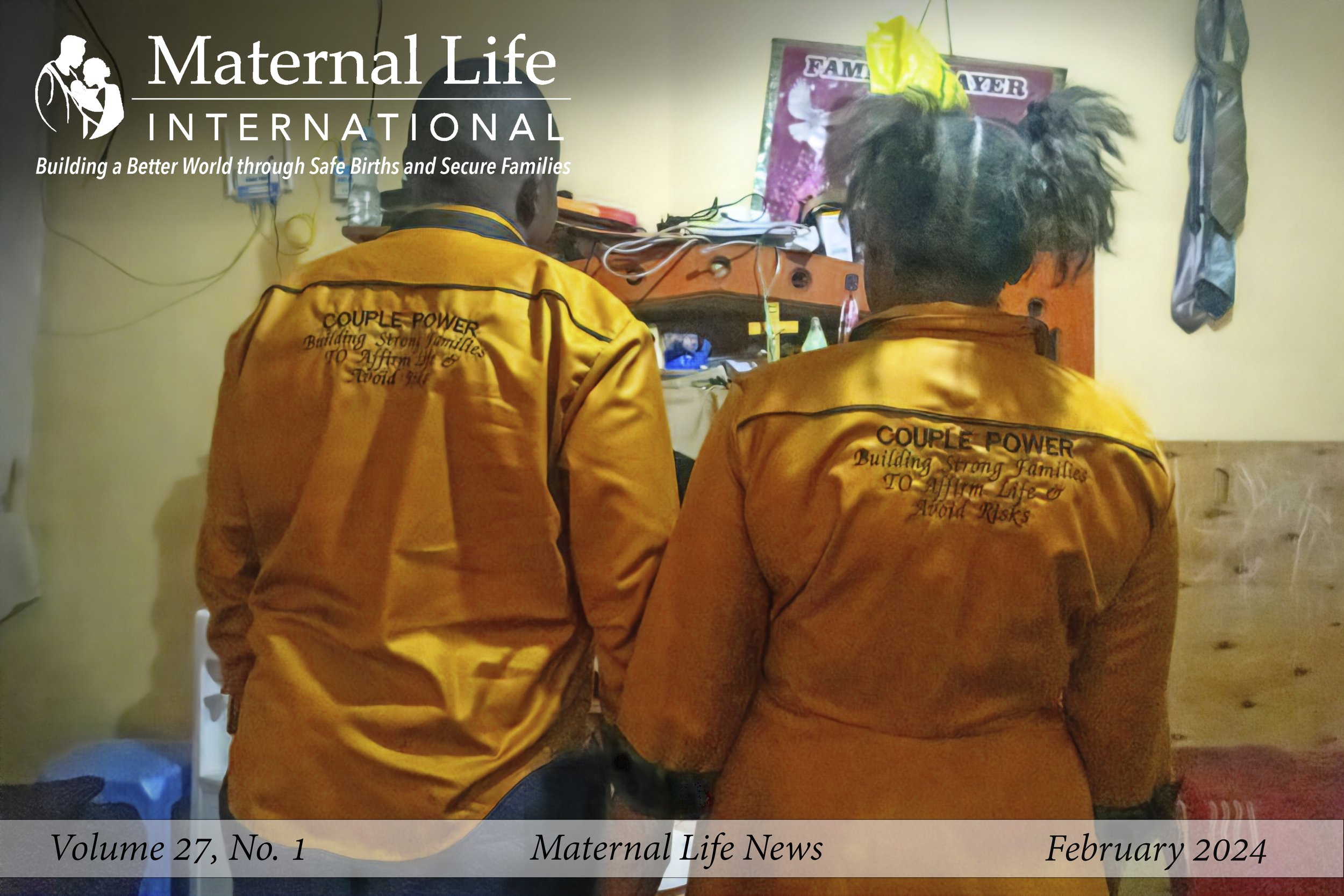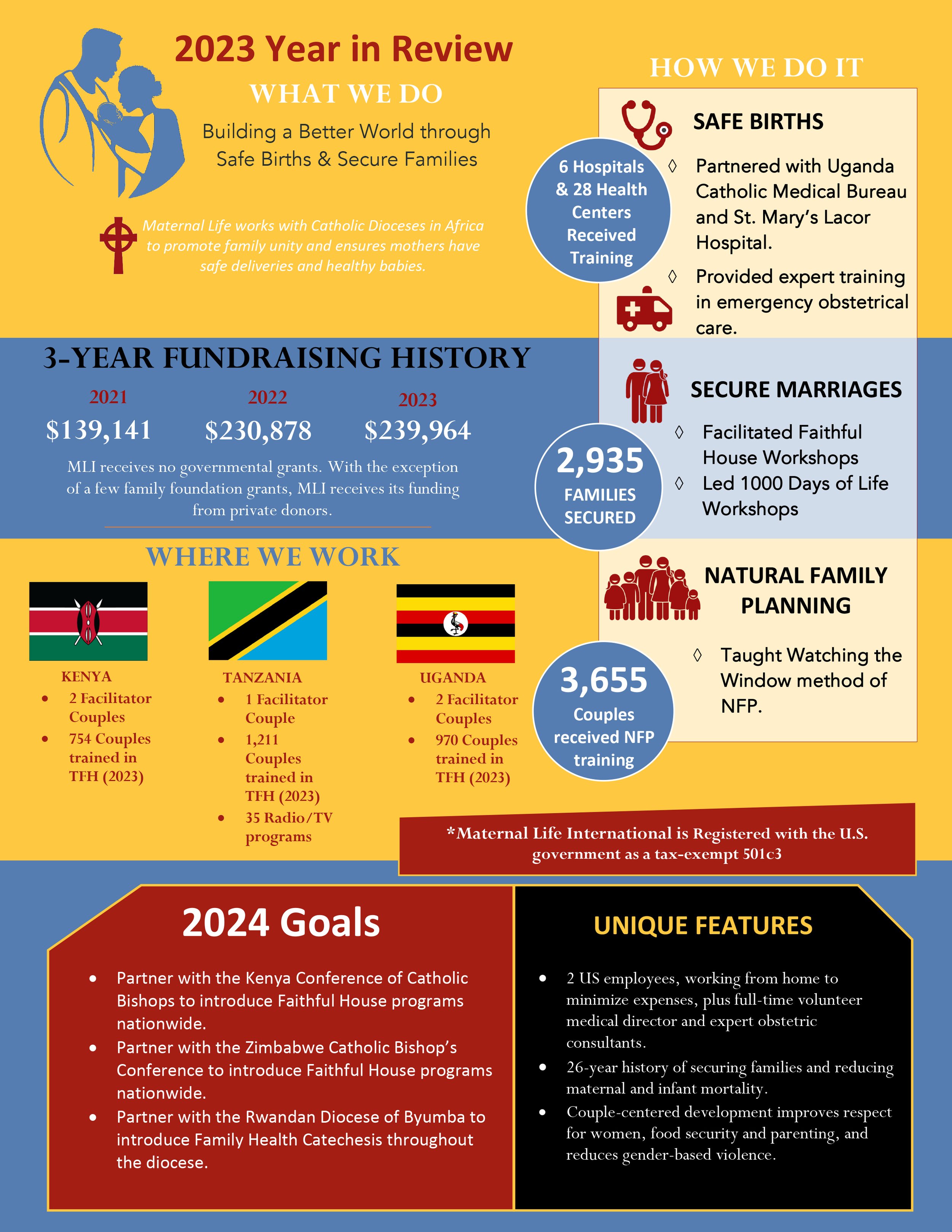Good Soil
By Hillary James
As our taxi driver navigated through the patchy dirt paths lined with tenement buildings on the outskirts of Nairobi, I marveled that Dr. George’s Faithful House curriculum, written in Montana back in 2005, has now reached even this haphazard, modest suburb on the other side of the world. We hopped over mud puddles to enter a simple apartment courtyard with laundry hung across the apartment windows to dry, and I met Edith, a Kenyan wife and mother of 4 young ones, and her husband Franklin who is a local teacher. Edith and Franklin welcomed me into their front room which serves as kitchen, dining and living room, with a small back bedroom for the whole family. Sacks of beans and rice lined the wall behind the couch, and a small pot with a kerosene stove sat in one corner, which gets pulled out a few times a day to prepare meals. Edith crouched on the linoleum floor as I arrived to warm some tea to welcome me into their home.
Edith and Franklin with their 4 children, and 2 neighbor friends.
Edith and Franklin, beaming as they introduced their wide-eyed children one by one, are newly trained facilitators in Dr. George’s Faithful House curriculum, which was introduced to them a few years ago at their local parish. They led a prayer of gratitude as I arrived, saying that they never could have imagined that the organization that brought happiness to their home would come to visit them. They explained to me that in Kenyan culture, a home visit is the greatest honor one can bestow on a friend.
Edith said that she was ready to leave Franklin before they joined the Faithful House program. He spent more time outside the home than with her, she said, and they were constantly at odds. She said that when the Faithful House came to their parish, “I was so keen to learn” that even though her sister was in the hospital an hour by bus from the church, she took the 2-hour trip every week to make sure she didn’t miss a lesson. The couple noticed almost immediate improvements to their family environment after the first class. Franklin said he learned how to take responsibility within the household, “which is different from our culture.” Throughout our meeting, he was holding their newborn son Promise in his arms. Edith said she learned that if she doesn’t communicate with Franklin, “my problems will overflow and my words will become sharp. If I communicate small things well, it can be softer.” Franklin and Edith’s children sat quietly throughout our time together, folding their hands reverently as their parents led us in prayer both at the opening and the closing of our meeting.
Franklin said, “In our culture we do not let you go without feeding you something.” Edith brought out buttered bread and tea with milk that they had prepared specially for our visit. How proud they were to offer us these refreshments, and how hungrily the children scooped it all up and licked their fingers for this special occasion. Franklin told us, “Our children can see the difference too. They may not be able to say it, but they notice that things are different between Edith and me.”
According to our Kenyan facilitator Njoroge, our programs have the most immediate impact on women. He said, “It is the women who notice the most drastic difference. For men it is more subtle.” That is because sharing in the care of children, saying “I’m sorry” after a disagreement and setting aside time to sit with your wife and talk are not culturally typical for most African men.
We also visited Michael and Grace, a couple with 3 children who live in a larger home outside of town. They went through the program as well and are now facilitators. They told us that they cover the cost of tea and printing of manuals themselves when they run trainings. It is a sacrifice, but Grace said, “We take seriously God’s call to spread His message of peace and love to others.” Michael said his greatest takeaway from the Faithful House has been to share financial decisions with Faith. For Faith, her biggest lesson has been learning to be reliable, and to be where you say you are to your spouse. Michael said they had never had a Westerner visit their home before and asked me to participate in planting a palm tree together along their entrance. It symbolizes the “flourishing of our family from the programs you have given us.”
What a privilege it was for me to visit homes impacted by Maternal Life where harmony is palpable. To see the eyes of families with few material goods, but rich in familial love, reminds me that there is no greater way to impact a person than to bring more love into their home. It is a privilege to be a part of Dr. George’s vision for healthier and happier families in parts of the world without any mental health or counseling services.
News of our impact is growing. Both the national Catholic Family Life offices in Zimbabwe and Kenya have asked us to partner with them to offer Maternal Life’s programs throughout the country. Our only limitation is raising the funds needed to roll out our curriculum. Will you join us?
As I get along in years (full disclosure, 68 of them), I continue to be astonished by the world and the people in it. Not sure how I ended up in the village of Gihengeri, Rwanda. Gihengeri means “good soil” in Kinyarwanda. Reaching there, Hillary and I were met by over 100 people, the vast majority of whom were couples whose livelihood was growing beans and maize. Women came out in their best with brightly, multi-colored, “wrappas”. Men were a mix: the dress included ill-fitting suitcoats, mud-covered farm boots, a couple of Christmas-themed ties and a man wearing a beat-up cowboy hat – amazing what finds its way across the ocean. What was common to all was their sincerity.
They had come to thank us for The Faithful House program which had been embedded in their parish. Through your generosity, we also provided much needed food relief to Gihengeri during Covid and the economic lockdown in Rwanda. They had not forgotten and with light in their eyes, said over and over, “May God bless you.”
The short visit we had planned took on a longer life: a few speeches and, at their request, an impromptu Faithful House course. I first asked the men, “If you went to the market what is the best gift you could get for your wives?” and then posed the same question to the women “What is the best gift you could get for your husbands?” The top answer for both was---shoes! We turned the question into a deeper reflection, and agreed the best gift they could give each other is their togetherness. Couples of all ages shared their experiences: young couples telling how both husband and wife now help care for their children, a wife standing by her sick and aging husband saying how she helps to feed him. Some of them had formed cooperatives to assist each other as they improved their houses or worked their farms together. What is growing in the good soil of Gihengeri is transformative.
Full disclosure, I don’t cry easily. Yet, seeing these people and feeling in the deepest part of my heart the unity we have in the Body of Christ, more than a few tears came, mixed with the life-giving rain that fell as we left. Let’s keep up the good work. There are thousands of Gihengeris out there.






